Workers Without Bosses: Solidarity With Argentina's Self-Managed Factories
fwd | 25.08.2004 14:18 | Free Spaces | Globalisation | Social Struggles | World
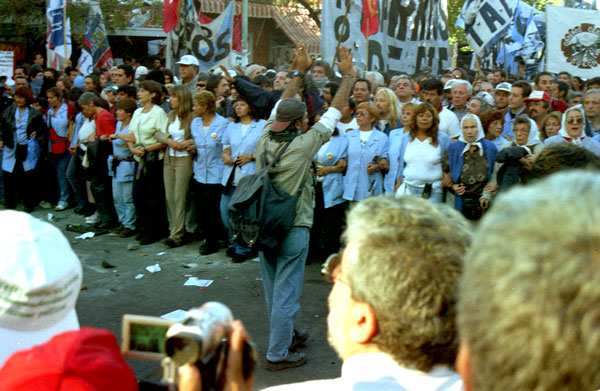
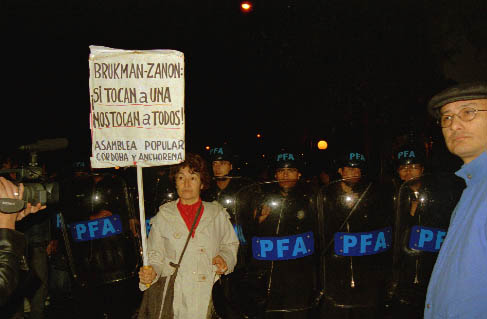
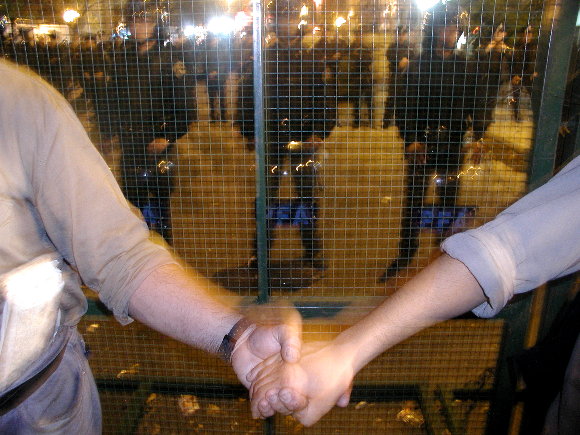
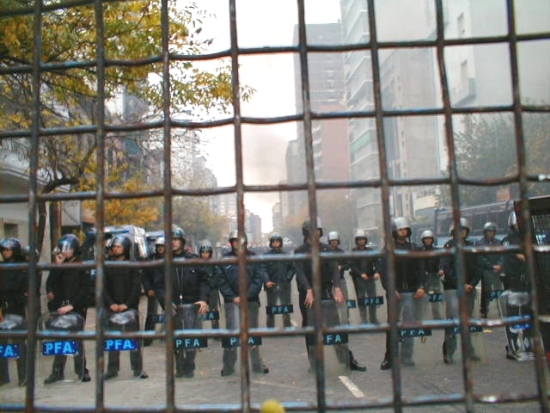
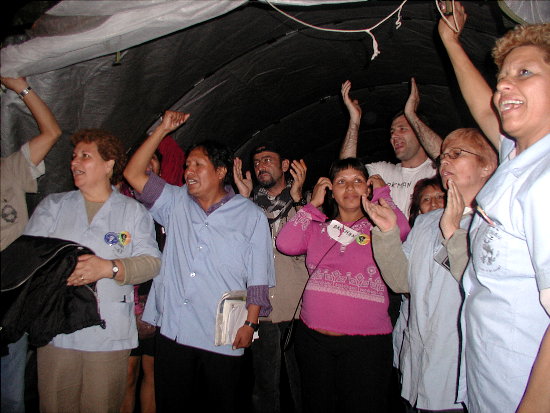
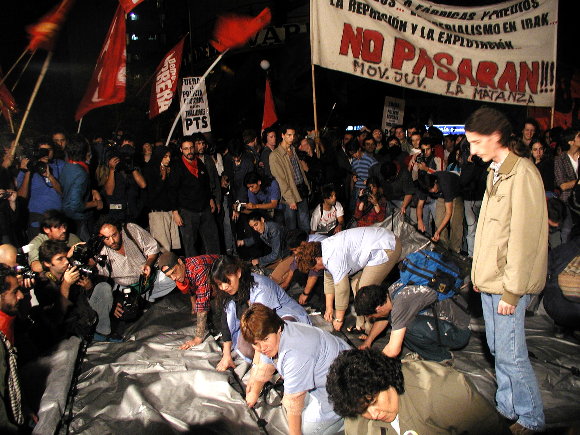
 http://workerswithoutbosses.net is a global network of people organizing assistance for Argentina's occupied factories. Our website contains information and ways to get involved, including organizing film screenings, getting machine parts, and working on a film to document it all.
http://workerswithoutbosses.net is a global network of people organizing assistance for Argentina's occupied factories. Our website contains information and ways to get involved, including organizing film screenings, getting machine parts, and working on a film to document it all. You are invited to raise awareness of the Brukman struggle by organizing a film screening in your neighbourhood or workplace, and then helping the Brukman workers directly by finding the machine parts and technical manuals that they need to continue working without bosses in Buenos Aires. This is a global call-out to workers, activists, translators, and media producers: your actions can directly benefit one of the largest experiments in workers self-management that has ever taken place.
We are asking that people take whatever actions they can to secure the needed parts and manuals, whether that means securing support and funds from within their unions, organizing neighbourhood fundraising campaigns to purchase a needed part or manual, or simply stealing them from their factories and popping them in the mail if that seems practical.
We also want to spark a global discussion about the possibilities and practicalities of a democratically-managed world economy. We need media workers from across the globe to film their local discussions after film screenings, film the stories of people who attempt to get the parts, and contribute video and sound segments back to our project so that we can edit up a monster of a worker-controlled, self-managed, globally produced film. Many of us are involved in Indymedia in one way or another, and we see this project as an opportunity to offer practical assistance from an emerging self-managed media system to an emerging self-managed production system that is under dire threat. Argentina's worker-controlled factories are highly successful enterprises; at some point, the bosses are going to want them back.
SOME BACKGROUND
In December 2001, the workers of the Brukman garment factory in Buenos Aires occupied their factory due to the collapse of the Argentine economy. They ran it successfully for well over a year.
18 April 2003: Midnight. Hundreds of police officers in riot gear evict the five workers staying on watch in the factory. Social movements in Buenos Aires mobilize to retake the factory, resulting in massive police repression.
Faced with unemployment in a country without any social benefits system, the Brukman workers mounted a campaign to recover their factory, in cooperation with other social movements. Across the street from their factory, they set up a working vigil, complete with sewing machines, tents, and a kitchen. Marches, street demonstrations, art workshops, and solidarity actions by other occupied factories such as the Zanon occupied factory in the far south of Argentina, finally resulted in victory by 29 December 2003.
On 29 December 2003, pressure from Argentina's social movements forced the government to allow the workers back into their factory. As the police withdrew, they stole one part from each machine in the factory, in an attempt to cripple its productive capacity.
Brukman needs your help!
Under the terms of the settlement with the government, the Brukman workers must pay the government for the factory within two years or the government will foreclose. The clock is ticking.
To view photos and see the machine parts that the Brukman workers need, go to
 http://www.workerswithoutbosses.net/...
http://www.workerswithoutbosses.net/... The workers of Zanon, another occupied factory in the south of Argentina, have a different request:
***********
The idea {of the website} is very interesting, I would like to know if it is possible that through this international website, we could research on a leather strip we need for a machine. The parts and brand are: Optibelt (Germany) B 472, B 512, B 551, B 583.
I will send you a text about Zanon to put on the website, but right now my comrades are looking for information on these parts.
***********
Information about what we have found out so far about these parts is at
 http://www.workerswithoutbosses.net/...
http://www.workerswithoutbosses.net/... HOW TO CONTACT WORKERS WITHOUT BOSSES
To contact Workers Without Bosses / Obreras Sin Patron, visit
 http://www.workerswithoutbosses.net/... or use the following lists:
http://www.workerswithoutbosses.net/... or use the following lists: contact (at) workerswithoutbosses.net is a privately-archived contact list (your email will not be put into publicly-accessible web archives).
list (at) workerswithoutbosses.net is a publicly-archived list that we use for everyday communications. To subscribe to this list, please visit the list information page
 http://www.burngreave.net/mailman/listinfo/workerswithoutbosses
http://www.burngreave.net/mailman/listinfo/workerswithoutbosses and fill in the form. To view what's happened so far, please visit the list archive at
 http://springnight.burngreave.net/pipermail/workerswithoutbosses/
http://springnight.burngreave.net/pipermail/workerswithoutbosses/
fwd
 Homepage:
http://portland.indymedia.org/en/2004/08/295247.shtml
Homepage:
http://portland.indymedia.org/en/2004/08/295247.shtml
Comments
Hide the following comment
The Ghost Shirts
25.08.2004 15:03
by Mike Davis
September 1, 1934: Millions of cotton spindles stopped spinning. Across the Southern Piedmont, mill whistles blew but workers didn't come to work. The most exploited industrial workforce in the United States -- the "lint heads" of the Carolinas, Tennessee, Georgia, and Alabama -- was on strike.
As mill owners appealed frantically for injunctions, tear gas, and the National Guard, a vast, peaceful army of textile workers demolished the image of Southern labor as culturally servile and unorganizable. With voices honed to spare beauty in the choirs of mountain Baptist churches, they sang, instead, powerful hymns of solidarity.
And they were robustly answered (often in Portuguese, Italian, or French) by the mill workers of New England who joined what became the first industry-wide general strike of the 1930s. It was also the most violently repressed. Before FDR (more concerned to appease the "lords of the loom" than to liberate their slaves) cajoled the national textile union to call off the strike, thousands had been beaten, tear-gassed, and arrested. Thirteen –- mostly in the South -- had been shot dead.
Now, seventy years later, with only a handful of moist-eyed veterans left alive to remember the heroism and heartbreak of the Great Textile Strike, the cotton spindles in Dixie have once again stopped spinning. But this time they've stopped forever. The American textile and clothing industries are dying. Since the inauguration of George W. Bush in January 2001, 350,000 textile jobs -- almost a third of the total -- have been lost. Another 400,000 jobs are expected to disappear by the end of the decade.
Textile manufacture in the Piedmont, today as in 1934, is largely a monoculture, and as the mills close, towns die with them. Already too many Main Streets in the upland South are populated only by thrift stores, drug counseling services, and military recruiters. The parallel decline of the clothing industry is likewise eroding the survival economy of recent Latino and Asian immigrants in the tenement districts of downtown Los Angeles, New York, and Miami. Soon even sweatshops will be remembered with nostalgia.
Thus, another large segment of the American industrial working class is being fast-forwarded to that brave new world that Kurt Vonnegut predicted with such eerie prescience in his 1952 novel, Player Piano: a society of discarded laborers whose only option is enlistment in the imperial legions fighting wars for oil and other resources on distant frontiers. (Michael Moore's Fahrenheit 9/11 -- particularly scenes of Marine recruiters trawling for Flint, Michigan's unemployed youth -- is, of course, Player Piano in real time.)
This almost invisible tragedy -- who talks about plant closures on Fox News or CNBC? -- is part of a larger global jobs catastrophe that follows in the wake of trade liberalization. The final quota barriers protecting American textile and garment jobs will be dismantled next January. Since Beijing's accession to the World Trade Organization (WTO) in 2001, its soft exports to the United States have doubled, and the British Financial Times predicts that China will grab the greater share of the global market in a breathtakingly rapid restructuring that will eliminate millions of jobs worldwide from Danville to Dhaka.
China's chief comparative advantage, as the AFL-CIO argued last March in a petition asking the U.S. trade representative to promote the rights of Chinese factory labor, emerges from the government's "unremitting repression of workers' rights" and the ruthless exploitation of an estimated 100 million rural migrants. Indeed, a recent article in Monthly Review claims that economic inequality in China, once amongst the lowest in the world, has now risen to "near Brazilian and South African levels."
The Bush administration, not surprisingly, rejected the AFL-CIO appeal to enforce the (non-binding) core covenants of the International Labor Organization; nor can labor expect much more solidarity from a Democratic Party that prides itself on NAFTA and the WTO. Certainly, John Edwards may strike some heroic poses outside shuttered textile plants in his home state of North Carolina, but that doesn't mean, to quote an absurd campaign slogan, "help is on the way." The dominant Party line, as argued on the op-ed page of the New York Times recently by William Gould IV (former President Clinton's chairman of the National Labor Relations Board), is instead "keep labor standards out of trade agreements."
In the eyes of most leading Democrats, the epochal achievement of the Clinton years was bringing the wealth and glamour of the "New Economy" into the party. No chance, then, that a Kerry-Edwards White House would risk biotech's intellectual property rights or Hollywood's lucrative royalties in the new capitalist China for the sake of some "lint-heads" in Georgia or undocumented immigrants in Los Angeles.
In the face of this free-trade juggernaut, unionized textile and garment workers (since 1995 fused together in a single union called UNITE) merged this summer with HERE, the dynamic hotel-workers union. Although UNITE HERE promises to devote half of its budget to new organizing, it may be too late to save the jobs imminently imperiled by trade liberalization. Edna Bonacich (coauthor of Behind the Label: Inequality in the Los Angeles Apparel Industry) is both a leading academic expert and a respected activist. I asked her for a frank view of the situation. "UNITE," she said, "will likely lose a big chunk of its membership. Already the union has shifted focus from garment workers, believing it is hopeless to organize them because of the potential flight of the industry offshore."
"Certainly Los Angeles, as an apparel center and magnet for immigrants," she continued, "will suffer severe consequences. The victims will tend to be the newest and poorest of immigrants. Whatever of the industry remains in the United States is guaranteed to operate at the lowest levels of worker protection." Bonacich believes that heroic but localized fights against plant closure are doomed to failure. "This is too big an issue to handle on a piecemeal basis," she concludes, conceding that a recipe for globalized worker resistance to global capital -- "the political question of our times" -- remains elusive.
In Player Piano, the remnants of the skilled working class (like the last of the Plains Indians) form a millenarian resistance movement, the "Ghost Shirts," before final defeat and disorganization. On the forgotten anniversary of an epic strike, Vonnegut's cautionary tale has a new meaning.
Mike Davis is the author of Dead Cities: And Other Tales as well as Ecology of Fear, and co-author of Under the Perfect Sun: the San Diego Tourists Never See, among other books.
Copyright C2004 Mike Davis
[This article first appeared on Tomdispatch.com, a weblog of the Nation Institute, which offers a steady flow of alternate sources, news, and opinion from Tom Engelhardt, long time editor in publishing and author of The End of Victory Culture and The Last Days of Publishing.]
paste from ZNet
 Homepage:
http://www.zmag.org/weluser.htm
Homepage:
http://www.zmag.org/weluser.htm